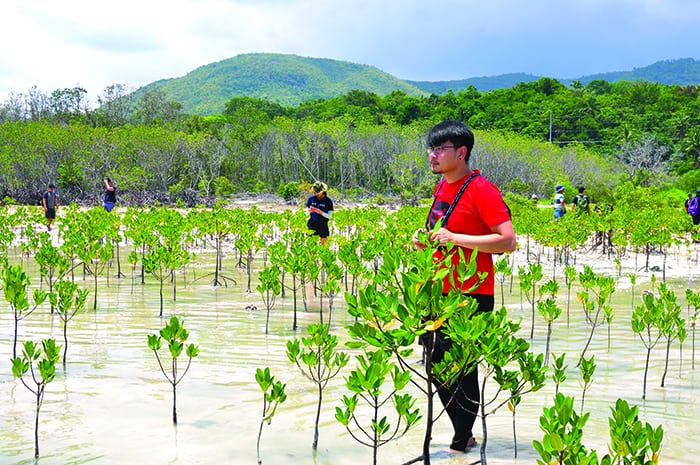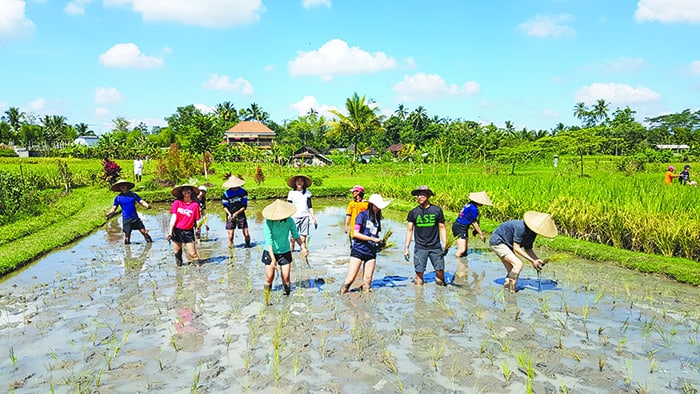With NTU and NUS taking the lead in environmental studies, there’s more avenues for education to explore.

Environmental Studies expands your knowledge and broadens your perspective
Environmental problems are challenges involving multiple stakeholders. Recognising this, the NUS Bachelor of Environmental Studies (BES) programme administered by the Department of Biological Sciences and the Department of Geography combines science disciplines from a diverse range of areas whilst helping to nurture students’ passion for the environment and conservation. You will get a broad base of foundational modules that will open your eyes to the diverse and complex challenges facing the Earth. You will read a variety of modules offered by the different departments in NUS, such as environmental law, public health, and environmental economics. This will enable you to identify, analyse and solve environmental challenges effectively.
Environmental Studies Is Relevant
People and companies are increasingly aware of the environmental crisis we are facing and are putting in more effort to be more sustainable in their practices. The United Nations has developed the Sustainable Development Goals, and governments around the world are drafting tighter environmental laws and regulations. Being an Environmental Studies student, you will be well informed and knowledgeable about environmental and sustainability issues and will be able to better educate the public and companies to make informed decisions on their actions. You will also gain marketable, relevant skills to contribute to sustainability in Singapore and the region.
You Will Be Offered Multiple Opportunities to Participate in Field Courses Overseas and Experience Nature
Environmental issues are global and interconnected. The NUS BES programme strives to create regional advocates for the environment. Students are encouraged to look outside Singapore and learn more about the conservation and management of the environment and ecosystems in other countries. At NUS, students can expect to gain exposure through overseas field trips to gain first-hand knowledge of the challenges and solutions in a developing country setting, and also engage with local conservationists via talks and panel discussions. Through such exposure, you will understand how environmental challenges affect local communities, how conservation is done on the ground and the various geographical, political and socioeconomic factors that influence the success of conservation initiatives.
Meet Like-Minded People Who Are Passionate About the Environmental Cause!
As a student pursuing a degree in environmental studies, you will be surrounded by coursemates who are passionate about the environmental cause. At NUS, the BES student committee organises various events, such as the International Coastal Cleanup and engagement sessions with environmental experts, nature photographers as well as BES alumni who are working in environmental organisations. The NUS BES Drongos is a nature guiding group that conducts guided walks for the public at MacRitchie Reservoir Park. Through such guided walks, the public is introduced to the local biodiversity and ecological systems in Singapore. Your coursemates may also be involved with other environmental advocacy outside campus, to which you may be interested in contributing. You will definitely be able to learn more from each other and expand your network in this close-knit community.
As an Environmental Studies Graduate, You Will Be Prepared for Graduate School and a Wide Range of Career Opportunities
Environmental Studies graduates are sought after by employers as they are well trained to think broadly and deeply, and are able to identify, analyse and come up with solutions to address environmental issues effectively. Graduates of this course obtain employment in a variety of fields, including environmental organisations, public administration, private environmental consulting firms or NGOs. Many students also gain experience as researchers attached to universities, or enter graduate school to pursue research or academia as a career.
NUS offers the Bachelor of Environmental Studies (BES) as a 4-year direct Honours degree programme, with a specialisation in Environmental Biology or Environmental Geography. More information can be found at envstudies.nus.edu.sg.

Interdisciplinary Focus and Applications
Environmental knowledge is relevant everywhere. At ASE*, we are an interdisciplinary school that integrates earth and environmental life science, ecology, engineering and technology, human ecology, humanities, and the social sciences to address key issues of the environment and sustainability. Such knowledge can be applied in almost every field such as geotechnical engineering, natural resource exploration, urban planning and even the financial sector.
Field Courses
Work in the field is a key part of studies in the environmental stream. While many students who study Environmental Earth Systems Science may not pursue field-based careers, our belief is that field studies provide an understanding of the Earth and environment that cannot be gained from classroom studies alone. Studies in the field give students the opportunity to connect concepts they have learned in the classroom with the real world, to learn the cutting-edge techniques used in scientific research, and to engage with the world around them. Field studies also offer a unique opportunity to connect with faculty and fellow students in a collaborative and fun environment.
Culture and Community
The environmental stream brings together people from diverse academic fields and from different parts of the world, all with similar passion and values. The wide range of personal backgrounds and perspectives that people bring makes it a welcoming and exciting community. This community will go far beyond the classrooms and continue long after graduation.
Relevant and Useful
In the last decade, attitudes across the world towards the environment have shifted. Where once there was a lack of education, inattention and disbelief about the world’s environmental problems, now there is a growing understanding of the causes of environmental problems and their potential solutions. Knowing about the environmental processes and the earth systems will allow environmental students to better contribute to our changing society and make important decisions that could shape the future.
Career Options
Having a degree in Environmental Earth Systems Science will open up various pathways and opportunities. Students will be prepared with diverse skill-sets and knowledge to fill a wide array of both public and private sector positions, or to pursue graduate programmes. Graduates will be able to pursue career opportunities in environmental or geotechnical consulting, conservation, environmental policy and planning, sustainability, teaching, research and so much more. At ASE, students are prepared for their next steps after graduation and educated on the various career paths available.
An Urgent Need for Environmental Graduates
Humans have caused or influenced various climate and environmental problems, and we need to act boldly and swiftly to solve them if we are to ensure the safety of our planet for future generations. Having a society that is well informed about the environment will make a big difference in overcoming the deterioration of our natural world.
* Asian School of the Environment, Nanyang Technological University
